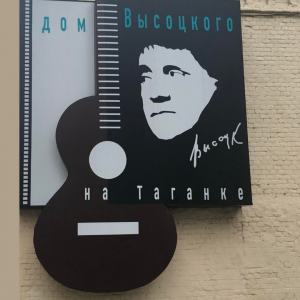The Season of Vytsotsky
Arriving with a smell of vodka, a haze of cigarette smoke, and the haunting voice of a man, piercing the air with raw, unbridled passion.
Time to read: 5 min.I have my preferred voices for every season of the soul, but none break in like Vysotsky’s. It barrels forward with the force of a thousand wild horses, swiping on its path all that is trivial. His gruff baritone drags me from the silent void, thrusting me into the thick of life – raw, bleeding, lashing like a whip, and throbbing like a pressurized artery.
I can recall precisely when I fell in love with this or that performer, yet I can’t put my finger on the year I fell for Vladimir Vysotsky. Somehow, he has always sounded near and within me. And though our hearts beat together only seven short months, I carry on having some of my most meaningful discussions with him to this day. Whether scaling mountain peaks or arguing with drunken inspiration in front of the television.
A few years back, I had the opportunity to visit Vysotsky’s Museum on Taganka Street in Moscow. Gazing at the vast collection of preserved “behind the screen” notes, drafts, sketches, and letters, I was rendered speechless. Scattered across the continuum of years were letters to friends and colleagues—each a mesmerizing fusion of subtle humor and reflective insights; random quotes from passages he read and treasured, ironic nudges at the absurdities of the ideological system to which he refused to succumb, jolted down lyrics, scribbled rifts, corrected verses, refined rhymes… Together, they form one of the most poetically beautiful and abundant of creative explorations.

I have enough to sing, presenting myself before the Almighty, Vysotsky wrote in his final poem dedicated to his wife, Marina Vlady, as if sensing the end. He passed away at 42, leaving a remarkable body of work, vast enough to span several lifetimes multiplied by 42. He never managed to rein in his capricious horses. Nor did he conquer his dependence on alcohol, cigarettes, and pills. Yet, his true ailment, of course, was not addiction. It was Time. The malady of time, misdiagnosed and treated as something else, is doomed to relapse again and again – until that inevitable final burst.
Vysotsky gifted us not a mere legacy of poems but an all-encapsulating diary. Yet, his is no ordinary journal of memories, for contrary to popular belief, he himself was no soldier at the frontlines, no war pilot or marine. Rather, it is a diary that chronicles human life’s endangered and salvaged realities, which is why his words transcend time and resonate so powerfully to this day. Within its pages, even the most trivial occurrences, the most mundane beats of everyday life, speak of essential truths. They reassure that even if someone has already occupied the palace (and darn it, someone always has), there is also paradise in the shack. That it is permissible to detest those who forsake their principles and let them know as much. That should a foe be poised to stab you in the back, it falls to you to turn and strike first. That prolonged silence shall be awarded a defeating uproar. That loving is living. That amid the countless paths untaken, one alone is mine…
At times, I become livid with his premature departure. Why could you not tame those mad stallions of yours? I demand, searching for a suitable answer. You could have lived to see 85. You could have completed your verse. We might have even met on some remote corner of the globe. Why…? Because we creators are peculiar birds, replies he. Instead of peacefully soaring southwards, defying all natural laws, we are always drawn north. And because that’s how the world is arranged: Возвращаются все, кроме тех, кто нужней.
Perhaps that’s how it ought to be – heroes must die, or else they become the dullest of beings, as Remarque once noted. This is why, try as I might, I cannot conjure Volodya Vysotsky—that untamed, flawed, larger-than-life figure—in today’s world. Sharing selfies on Instagram and relishing his ten thousand likes. Riding the virtual wave, producing his magnum opus with his younger avatar. Nor can I envision a Vysotsky who communicates with his audience through his personal Facebook page, poetically contemplating the processes of aging before a faithful crowd. Howling still, not from the edge of the abyss, but from his wheelchair. Нет, ребята, все не так…
Vladimir Vysotsky departed as the most revered artist from behind the former Iron Curtain, only to be reborn as a universe in his own right. He sailed away as a ship, only to return as a white stork. Those who know him – if not personally, then in spirit – and those who understand him – if not linguistically, then on a molecular level – eagerly anticipate the stork’s appearance on the horizon. As a harbinger of that special mid-season that arrives with a heady smell of vodka, a haze of cigarette smoke, the strum of a seven-string acoustic guitar, and the haunting voice of a man, piercing the air with raw, unbridled passion. The season of Vysotsky.
Ну, поехали.
Read in Bulgarian.

